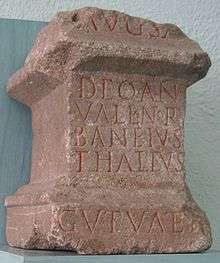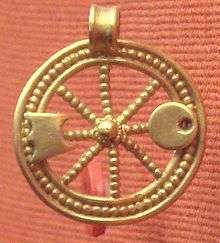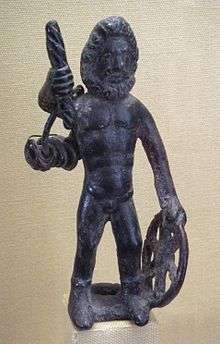Anvallus
Anvallus was a Gaulish god, known from several public inscriptions at Augustodunum (Autun). Two Latin inscriptions on altars were dedicated by gutuatres in requital of vows; both such dedications began with the formula Aug(usto) sacr(um).[1][2] The title gutuater is typically understood to mean 'priest';[3] the gutuatres have at times been taken to be Romanized continuations of the druids.[4] These altars were both discovered in 1900 on the site of Autun's railway station, along with a Greek-style helmet of thin bronze that would have been left there as a votive offering.[5]
The third text mentioning a name similar to Anvallus was a Gaulish text found on a limestone cartouche:[6]
According to P.-Y. Lambert[8] and J.-P. Savignac,[9] this stone commemorated the dedication of a kind of seat or throne by a person named Licnos Contextos. The seat was dedicated to a sanctuary of Anvalos, in the interpretation of P.-Y. Lambert;[6] Delmarre gives the translation "Licnos Contextus dedicated to Anvalonnacos the (golden?) seat".[10]
The god's name has been analyzed as a composition an-ualos, of which the second root has been understood to mean 'sovereign' or 'prince', and the first 'without' or 'not'.[11] The name might therefore be understood as 'without a sovereign', i.e. inferior to none.
References
- 1 2 CIL XIII:11225.
- ↑ CIL XIII:11226.
- ↑ Xavier Delamarre (2003). Dictionnaire de la langue gauloise. Errance, Paris, p184.
- ↑ Monique Clavel-Lévêque (1989). Puzzle Gaulois: les Gaules en mémoire : images, textes, histoire, Volume 396. Presses universitaires de Franche-Comté, p423.
- ↑ J.-G. Bulliot (1901). "Découverte de deux inscriptions romaines et d'un casque votif à Autun." Bulletin monumental. Retrieved from Gallica on 2011-06-03.
- 1 2 3 "Inscriptions gauloises : Le cartouche d'Autun". Encyclopédie de l'Arbre Celtique. Retrieved 2011-06-03.
- ↑ CIL XIII:2733.
- ↑ P.-Y. Lambert (2003). La langue gauloise. Errance, Paris.
- ↑ J.-P. Savignac (2000). Merde à César. La différence.
- ↑ In the original, “Licnos Contextos a dédié à Anvalonnacos le siège (d’or ?)”. Xavier Delamarre (2003). Dictionnaire de la langue gauloise. Errance, Paris, p331.
- ↑ Xavier Delamarre (2003). Dictionnaire de la langue gauloise. Errance, Paris, pp43, 305.


